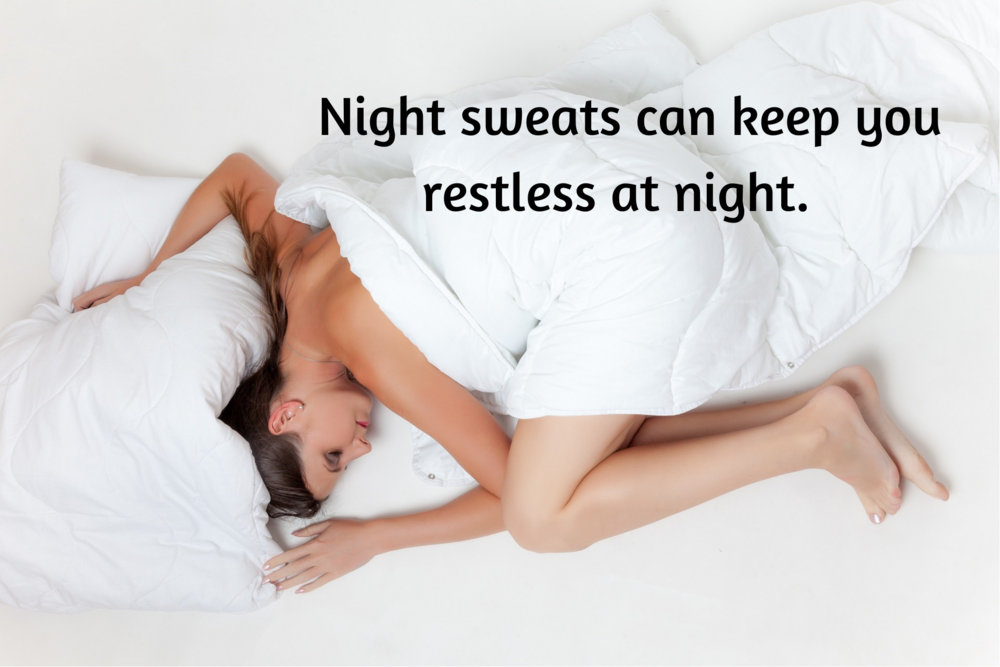This post may contain affiliate links, which means I may earn a commission if you click on the link and make a purchase. Be assured that I only recommend products that I have thoroughly researched and believe will add value to you.
Are you tired of waking up in the middle of the night, drenched in sweat, and struggling to get back to sleep? You’re not alone. Night sweats can be a real nightmare for many women, disrupting your precious sleep and leaving you feeling exhausted the next day. As we get older, night sweats become a somewhat unavoidable experience for many women in their late 40s. When you start experiencing them, night sweats can be truly concerning, however, there are steps you can take to beat night sweats and regain the restful sleep you deserve. In this article, we’ll explore 9 steps in detail, from understanding the causes to practical solutions for relief.
Understanding Night Sweats
Defining the Drench: What Are Night Sweats?
Night sweats, medically known as nocturnal hyperhidrosis, are episodes of excessive sweating that occur during sleep. They can leave your pajamas and sheets soaked and lead to discomfort and sleep disturbances. Some women have reported changing their pajamas and sheets in the middle of the night because of the wetness. When I was younger, listening to these conversations sounded like a myth or somewhat exaggerated by the older women I encountered. These women were disregarded and never taken seriously. However, as I get older and look back, I feel guilty for not empathizing with these women. Night sweats are real and can be caused by many different conditions. Moreover, studies have reported that night sweats are quite common in both men and women and are underreported.
Common Culprits in Women
- Hormonal Fluctuations: Ladies, our hormones are often the primary suspects. Menopause and perimenopause are notorious for bringing on night sweats. Raise your hand if you’re in one of these stages of your life, and have not experienced night sweats! While it is possible that the aging journey is different for every woman, night sweats are one of the most talked about scenarios for women in midlife. The fluctuating levels of estrogen and progesterone can wreak havoc on our body temperature regulation, leaving us confused and helpless when everyone else around us is in deep slumber.
- Medications and Medical Conditions: Certain medications, like antidepressants and hormone therapies, can trigger night sweats. Additionally, medical conditions such as thyroid disorders and infections can contribute. My doctor also advised that I undergo a scan to rule out cancer of the lymph nodes, a serious condition that can cause night sweats. If you’re in the midlife transition, I bet your healthcare provider has made some of these scary suggestions to you as well.
- Lifestyle Factors: Sometimes, it’s the way we live that’s causing the sweat fest. Stress, dietary choices, and even the clothes we wear to bed can play a role. On the dietary aspect, it is not always what we eat but also the nutrients we may not be getting enough from our food, like vitamin B6 and fish oil as one study revealed.
Steps to beat night sweats
Step 1: Consult a Healthcare Professional
The first and most crucial step in dealing with night sweats is to seek professional help. This is not the time for Dr. Google or speaking to twenty-five women to compare notes on their experiences. A healthcare provider can help you identify the underlying causes and determine the most appropriate treatment options. Besides, for your peace of mind, it will be good to eliminate any suspicious illnesses. When I first started experiencing night sweats during perimenopause, I tried every home remedy I found online and spoke with older girlfriends and family. It was only after talking to my doctor that I got the guidance and support I needed. My doctor had me do a battery of tests and repeated blood work to rule out any condition that could be disguised by night sweats.
Step 2: Keep a Night Sweats Journal
Your journey to beating night sweats begins with understanding your body better. Keeping a night sweats journal can help you identify triggers and patterns, making it easier to manage the problem. You can find free digital diaries that will collect the entries and analyze patterns over time. Journaling helped me realize that it was not just the changing hormones, but also that certain foods and drinks triggered more night sweats. By consistently jotting down these details, you may uncover patterns that provide insight into the causes of your night sweats. I must add that you bring this journal with you when you visit your primary care doctor. It could help eliminate some guesswork.
How to Keep a Night Sweats Journal:
- Record the Date and Time: Note when you experience night sweats.
- Rate the Severity: On a scale of 1 to 10, how bad were the night sweats?
- Dietary Intake: Document what you ate and drank before bedtime.
- Stress Levels: Describe your stress levels that day.
- Clothing: Take note of the pajamas or bedding you used.
Step 3: Optimize Your Sleep Environment
Creating a comfortable sleep environment is essential for managing night sweats.
- Temperature Control: Maintain a comfortable room temperature and use a fan or air conditioning if necessary.
- Bedding and Sleepwear: Choose breathable, moisture-wicking bedding and sleepwear. Cotton and moisture-wicking fabrics can help keep you dry and cool.
Step 4: Adjust Your Diet
Your diet can have a significant impact on night sweats. Some foods and beverages can trigger episodes, while others may promote better sleep.
Foods and Beverages to Avoid Before Bed:
- Spicy Foods: These can raise your body temperature.
- Caffeine and Alcohol: Both can disrupt your sleep patterns.
- Heavy Meals: Eating a large meal close to bedtime can lead to indigestion and discomfort.
Foods That May Promote Better Sleep:
- Cherries: They contain melatonin, a hormone that regulates sleep.
- Bananas: Rich in potassium and magnesium, they can help relax muscles.
Step 5: Manage Stress
Stress is a known trigger for night sweats, so finding ways to manage it can make a big difference. Here are some stress reduction techniques you can employ, but also keep in mind sustainable results require consistency:
- Meditation and Mindfulness: These practices can calm your mind and reduce stress.
- Relaxation Exercises: Try progressive muscle relaxation or deep breathing exercises.
- Yoga and Exercise: Regular physical activity can help reduce stress and improve sleep quality.
Step 6: Stay Hydrated
Dehydration can worsen night sweats, so it’s crucial to stay hydrated. Are you one of those who find it challenging to drink even a litre of water a day? You will have to find alternative ways to make water more appealing because you’ll need lots of it. Also, remember that timing is key.
- Drink plenty of water throughout the day but cut back on fluids close to bedtime to reduce the chances of waking up for a bathroom trip.
- Opt for herbal tea like chamomile and valerian root tea that can be soothing without overloading your bladder.
Step 7: Clothing Choices
What you wear to bed matters when it comes to managing night sweats.
- Choose Breathable Fabrics: Lightweight, breathable fabrics like cotton and moisture-wicking materials can help keep you cool and dry.
- Avoid Heavy, Restrictive Clothing: Tight-fitting or heavy pajamas can trap heat and exacerbate night sweats.
Step 8: Medications and Supplements
Some over-the-counter options can provide relief from night sweats. I have found that evening primrose oil greatly relieves my symptoms, and I can vividly tell the difference on the nights that I miss the supplement. Here is more research about the effectiveness of evening primrose oil.
Recent studies also found that vitex agnus-cactus significantly lowered menopausal symptoms of hot flashes and night sweats for post-menopausal women. Despite the evidence, it’s essential to consult with your healthcare provider before trying them.
Step 9: Develop a Bedtime Routine
A consistent bedtime routine signals to your body that it’s time to wind down and prepare for sleep. Here are some bedtime Routine Ideas:
- Set a Regular Bedtime: Try to go to bed and wake up at the same time every day, even on weekends.
- Relaxation Activities: Read a book, take a warm bath, or practice gentle stretching to relax before bed.
- Limit Screen Time: The blue light emitted by screens can interfere with your sleep hormone production. Avoid screens at least an hour before bedtime.
Conclusion
Managing night sweats in women is possible with the right approach. Remember, it’s essential to consult with a healthcare professional to identify the root cause and receive appropriate treatment.
By implementing these 9 steps, you can find relief from night sweats, improve your sleep quality, and wake up feeling refreshed and rejuvenated. It may take some time and patience, but regaining restful sleep is worth the effort. Experiment with these steps so you can have sweet dreams!
Are you experiencing night sweats? Please share some of your relief strategies below.
Further Reading
Odai, T., Terauchi, M., Hirose, A., Kato, K., Akiyoshi, M., & Matsuda, N. (2019). Severity of hot flushes is inversely associated with dietary intake of vitamin B6 and oily fish. Climacteric, 22(6), 617–621.

